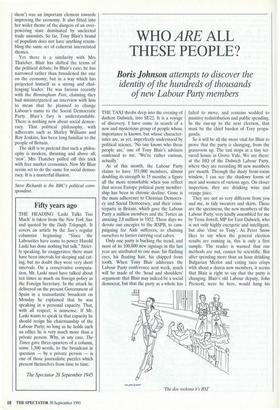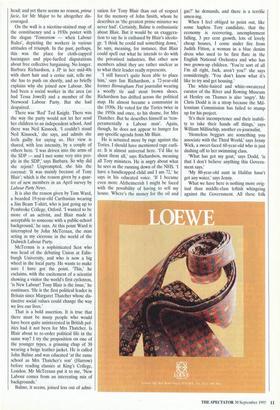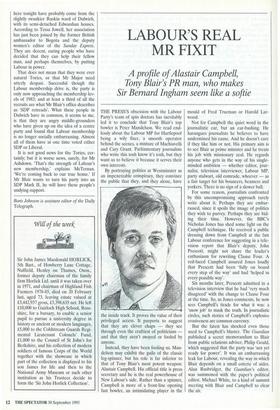WHO ARE ALL
THESE PEOPLE?
Boris Johnson attempts to discover the identity of the hundreds of thousands of new Labour Party members
THE TAXI throbs deep into the evening of darkest Dulwich, into SE22. It is a voyage of discovery. I have come in search of a new and mysterious group of people whose importance is known, but whose character- istics are, as yet, imperfectly understood by political science. 'No one knows who these people are,' one of Tony Blair's advisers confessed to me. 'We're rather curious, actually.'
As of this month, the Labour Party claims to have 351,000 members, almost doubling its strength in 15 months; a figure all the more remarkable when you reflect that across Europe political party member- ship has been in chronic decline. Gone is the mass adherence to Christian Democra- cy and Social Democracy, and their coun- terparts in Britain, which gave the Labour Party a million members and the Tories an amazing 2.8 million in 1952. These days we devote our energies to the RSPB, to cam- paigning for Aids sufferers, to chaining ourselves to lorries carrying veal calves.
Only one party is bucking the trend, and most of its 100,000 new signings in the last year are attributed to one man: his flashing eyes, his floating hair, his chipped front tooth. When Tony Blair addresses the Labour Party conference next week, much will be made of the 'head and shoulders' argument: that Blair may indeed be a social democrat, but that the party as a who e has failed to move, and remains wedded to punitive redistribution and public spending. In the run-up to the next election,, that must be the chief burden of Tory propa- ganda.
So it will be all the more vital for Blair to prove that the party is changing, from the grassroots up. The taxi stops at a tiny ter- raced house in Grove Vale. We are there: at the HQ of the Dulwich Labour Party, where they are recording 80 new members per month. Through the dusty front-room window, I can see the shadowy forms of men and women of various ages. On closer inspection, they are drinking wine and orange juice.
They are not so very different from you and me, in tidy sweaters and skirts. These are the specimens, the new members of the Labour Party, very kindly assembled for me by Tessa Jowell, MP for East Dulwich, who is not only highly energetic and intelligent, but also 'close to Tony'. As Peter Snow likes to say when the general election results are coming in, this is only a first sample. The reader is warned that our methods are not, cannot be scientific. But after spending more than an hour drinking Bulgarian Merlot and eating taco crisps with about a dozen new members, it seems that Blair is right to say that the party is changing. Blair's old Labour deputy, John Prescott, were he here, would hang his The doc reckons it's RSI' head; and yet there seems no reason, prima facie, for Mr Major to be altogether dis- couraged.
On the wall is a nicotine-stained map of the constituency and a 1930s poster with the slogan 'Tomorrow — when Labour Rules', depicting the workers in various attitudes of triumph. In the past, perhaps, this was the place for cloth-capped harangues and pipe-fuelled disputations about free collective bargaining. No longer. Barbara Richardson, a JP in her mid-40s with short hair and a cerise suit, tells me she has to push on shortly, and so briefly explains why she joined new Labour. She had been a social worker in the area (as had Tessa Jowell) and a member of the Norwood Labour Party. But she had despaired.
There was 'Red' Ted Knight. There was the way the party would not let her send her children to an independent school. And there was Neil Kinnock. 'I couldn't stand Neil Kinnock,' she says, and admits she feels guilty for saying so. Her view is shared, with less intensity, by a couple of others here. 'I was driven into the arms of the SDP — and I met some very nice peo- ple in the SDP,' says Barbara. So why did she rejoin? Unprompted, she hits the coconut: 'It was mainly because of Tony Blair'; which is the reason given by a quar- ter of new members in an April survey by Labour Party News.
It is also the reason given by Tom Ward, a bearded 19-year-old Carthusian wearing a Jim Beam T-shirt, who is just going up to Pembroke College, Oxford. 'I wanted to be more of an activist, and Blair made it acceptable to someone with a public-school background,' he says. At this point Ward is interrupted by John McTernan, the man acting as my cicerone in the world of the Dulwich Labour Party.
McTernan is a sophisticated Scot who was head of the debating Union at Edin- burgh University, and who is now a big wheel in the local party. He wants to make sure I have got the point. 'This,' he exclaims, with the excitement of a scientist showing a visitor the world's first cyclotron, `is New Labour! Tony Blair is the issue,' he continues. 'He is the first political leader in Britain since Margaret Thatcher whose dis- tinctive social values could change the way we live our lives.'
That is a bold assertion. It is true that there must be many people who would have been quite uninterested in British pol- itics had it not been for Mrs Thatcher. Is Blair about to re-order political life in the same way? I try the proposition on one of the younger types, a grinning chap of 30 wearing a beige leather jacket. He is called John Balme and was educated 'at the same school as Mrs Thatcher's son' (Harrow) before reading classics at King's College, London. Mr McTernan put it to me, 'New Labour comes from an interesting mix of backgrounds.'
Balme, it seems, joined less out of admi- ration for Tony Blair than out of respect for the memory of John Smith, whom he describes as 'the greatest prime minister we never had'. Certainly, Balme is enthusiastic about Blair. But it would be an exaggera- tion to say he is enthused by Blair's ideolo- gy. 'I think he could nail something down,' he says, meaning, for instance, that Blair could spell out what he intends to do with the privatised industries. But other new members admit they are rather unclear as to what their leader really represents.
`I still haven't quite been able to place him,' says Ian Richardson, a 72-year-old former Birmingham Post journalist wearing a woolly tie and stout brown shoes. Richardson has drifted across the political map. He almost became a communist in the 1930s. He voted for the Tories twice in the 1950s and once, to his shame, for Mrs Thatcher. But he describes himself as 'tem- peramentally a Labour man'. Again, though, he does not appear to hunger for any specific agenda from Mr Blair.
He is actuated more by rage against the Tories. I should have mentioned rage earli- er. It is almost universal here. `I'd like to shoot them all,' says Richardson, meaning all Tory ministers. He is angry about what he sees as the running down of the NHS. 'I have a handicapped child and I am 72,' he says in his educated voice. 'If I became even more Alzheimerish I might be faced with the possibility of having to sell my house. Where's the money for the oil and gas?' he demands, and there is a terrific amen-ing.
When I feel obliged to point out, like some hapless Tory candidate, that the economy is recovering, unemployment falling, 3 per cent growth, lots of lovely cheap houses, I come under fire from Judith Fitton, a woman in a blue denim dress who used to be first flute in the English National Orchestra and who has two grown-up children. 'You're sort of all I'm all right, Jack, aren't you?' she says consideringly. 'You don't know what it's like to try and get housing.'
The white-haired and white-sweatered curator of the River and Rowing Museum at Henley on Thames is also 'angry'. Mr Chris Dodd is in a strop because the Mil- lennium Commission has failed to stump up for his project.
`It's their incompetence and their inabili- ty to take their hands off things,' says William Millinchip, another ex-journalist.
`Homeless beggars are something you associate with the Third World,' says Jenny Wick, a sweet-faced 60-year-old who is just dashing off to her swimming class.
`What has got my goat,' says Dodd, 'is that I don't believe anything this Govern- ment says.'
'My 80-year-old aunt in Halifax hasn't got any water,' says Jenny.
What we have here is nothing more orig- inal than middle-class leftish whingeing against the Government. All these folk here tonight have probably come from the slightly swankier Ruskin ward of Dulwich, with its semi-detached Edwardian houses. According to Tessa Jowell, her association has just been joined by the former British ambassador to Bogota and the deputy women's editor of the Sunday Express. They are decent, caring people who have decided that they can help their fellow man, and perhaps themselves, by putting Labour in power.
That does not mean that they were ever natural Tories, or that Mr Major need utterly despair. Successful though the Labour membership drive is, the party is only now approaching the membership lev- els of 1983; and at least a third of all the recruits are what Mr Blair's office describes as 'SDP retreads'. What these people in Dulwich have in common, it seems to me, is that they are angry middle-grounders who have given up on the idea of a centre party and found that Labour membership is no longer socially embarrassing. Almost all of them have at one time voted either SDP or Liberal.
It is not good news for the Tories, cer- tainly; but it is worse news, surely, for Mr Ashdown. 'That's the strength of Labour's new membership,' explains McTernan. 'We're coming back to our true home.' If Mr Blair wants to turn his party into an SDP Mark II, he will have these people's undying support.
Boris Johnson is assistant editor of the Daily Telegraph.




































































 Previous page
Previous page